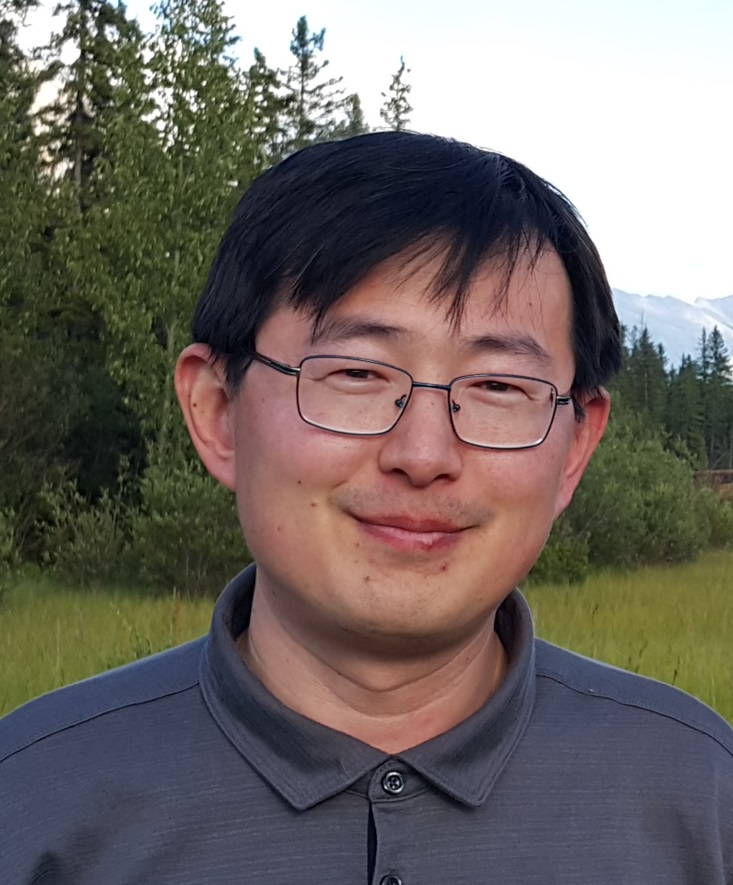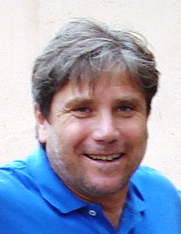International Assosication of Smart Learning Environments (IASLE, http://iasle.net/) is proud to kick off a series of webinars on generative AI and chatbot for the year 2024. The webinar series will be held online every couple of months and include four to six webinars covering various aspects, angles, practices, guidelines and experiences on the generative AI and chatbot relevant research.
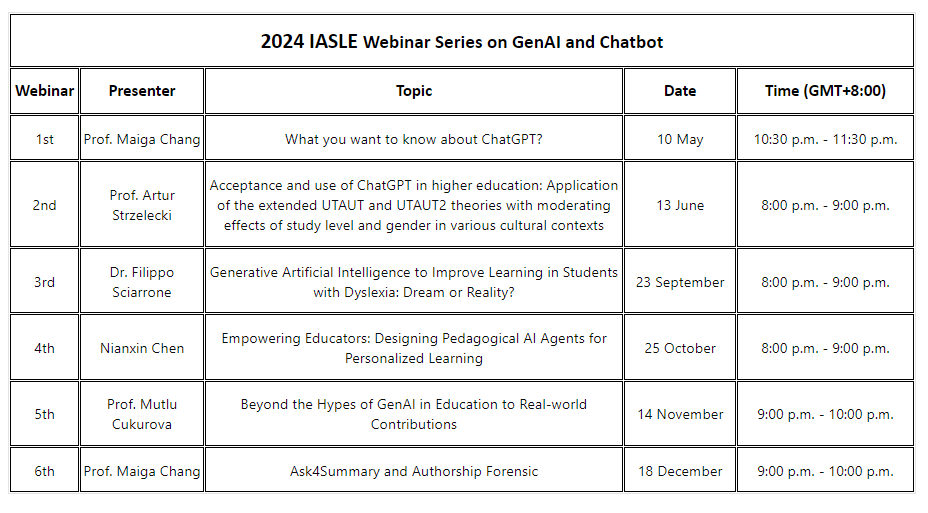
Webinar #3
Topic: Generative Artificial Intelligence to Improve Learning in Students with Dyslexia: Dream or Reality?
Date and Time: 8 PM in GMT+8 on September 23, 2024
Check for your local time at https://www.timeanddate.com/worldclock/fixedtime.html?iso=20240923T2000&p1=33
Free Registration Link:
Free Registration QR Code
Abstract
The ongoing interest in ChatGPT and its capability to improve work, tasks and Generative Artificial Intelligence (GAI), has now fully entered the field of learning, for people of all ages. It is now a fact that ChatGPT is used by millions of people as a support in both work and education. In the world, however, there are many people suffering from learning disorders such as dyslexia, dyscalculia, dysorthography and other specific learning disorders. This means that, especially in MOOCs, where there is no continuous relationship with the teacher, students with such disorders suffer in learning. This talk aims to reason about the use of GAI to support students with specific disorders, and in particular students with dyslexia, during their learning process. To this end, the state of the art together several works concerning the use of intelligent systems, are presented, with particular reference to intelligent chatbots. Some state-of-the-art systems will be shown.
Speaker
Filippo SCIARRONE, Associate Professor, Universitas Mercatorum, Italy
Speaker’s short bio
Filippo Sciarrone obtained a Ph.D. on the use of personalisation techniques and methods in the field of learning, with a focus on the application of artificial intelligence to education. Currently, Filippo Sciarrone is an Associate Professor at Universitas Mercatorum in Rome, Italy, where he is teaching several courses in computer science. His research interests mainly concern Technology Enhanced Learning, and in particular the application of Generative Artificial Intelligence techniques and methods to the educational field. He has led several research laboratories of companies for the production of algorithms and innovative systems for human resource management and for teaching-oriented recommendation systems. Currently he manages a research group on the use of generative AI to the construction of intelligent conversational agents for students with Specific Learning Disorders.
Webinar #4
Topic: Empowering Educators: Designing Pedagogical AI Agents for Personalized Learning
Date and Time: 8:00 PM to 9:00 PM in GMT+8, October 25, 2024
Check for your local time at https://www.timeanddate.com/worldclock/fixedtime.html?iso=20240923T2000&p1=33
Free Registration Link:
Free Registration QR Code
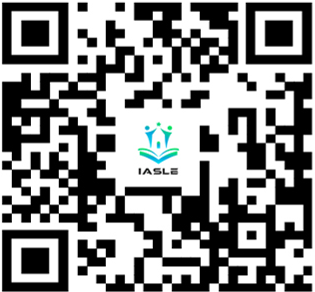
Abstract
A key strength of Large Language Models (LLMs) and generative AI lies in their ability to comprehend human language with depth and nuance, facilitating logical reasoning, planning, and execution of tasks. This capability has led to the assertion that anyone can become a programmer in the AI era. It empowers human teachers to collaborate with AI counterparts in crafting lesson plans using natural language. By mastering the design and deployment of these agents, teachers can tailor learning experiences to suit diverse student needs, guided by established learning theories and adaptive strategies. Acting as proxies for human teachers, AI agents extend the reach of teaching beyond physical constraints, enabling ubiquitous learning experiences. In this presentation, I will delve into the conceptual framework and design principles for developing pedagogical AI agents. Through live demonstrations, I will showcase the versatility of these agents using a universal client, which leverages robotic interfaces and general-purpose computing devices, such as tablets or computers.
Speaker
Nian-Shing CHEN, Chair Professor, Institute for Research Excellence in Learning Sciences and Program of Learning Sciences, National Taiwan Normal University, Taiwan
Speaker’s short bio
Dr. Nian-Shing Chen is a Chair Professor in the Institute for Research Excellence in Learning Sciences and Program of Learning Sciences at the National Taiwan Normal University, Taiwan. Professor Chen received the National Outstanding Research award three times in 2008, 2011, and 2015. He is ranked in second place on the Top Authors list by article count in Computers & Education, ranked 4th on the top scholar list in the educational technology field based on an article published in the British Journal of Educational Technology, ranked 3rd in the list of Social Sciences and Humanities Scientists in Taiwan. Based on AD Scientific Index 2023, Prof. Chen is ranked 8th in Asia and ranked 103th in the world in Education Research. He is listed as World’s top 2% scientists in 2021, 2022, 2023 and in the list of “Lifelong Science Influence Rankings (1960-2022)” by Stanford University.
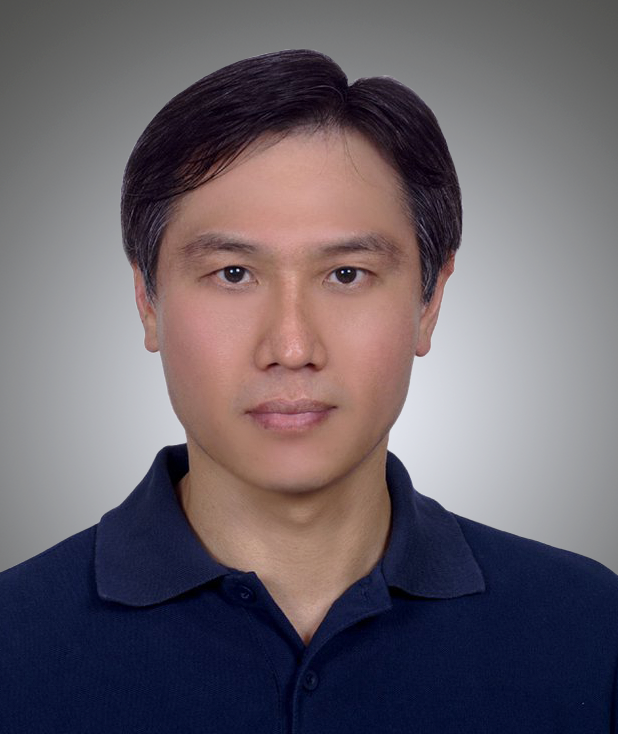
Webinar #5
Topic: Beyond the Hypes of GenAI in Education to Real-world Contributions
Date and Time: 9:00 PM to 10:00 PM in GMT+8, November 14th, 2024
Check for your local time at https://www.timeanddate.com/worldclock/fixedtime.html?iso=20240923T2000&p1=33
Free Registration Link:
Free Registration QR Code
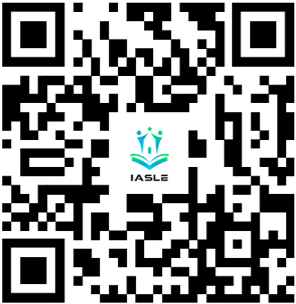
Abstract
The shiny allure of recent AI developments has been making headlines in recent years with the popularisation of large language models. Yet, the full potential of AI in educational research and practice remains largely untapped. This talk will navigate the confluence of Learning Sciences and AI, delving into three distinct conceptualizations of AI in educational research and practice. By drawing upon robust research evidence, I will unpack the benefits and limitations of each conceptualisation, painting a nuanced picture of how AI can be harnessed, grounded in our deep understanding of human learning processes and human values. The talk will conclude that against many tech leaders arguments, genAI solutions on their own are unlikely to revolutionise or democratise education. The journey of such changes is more than a tech challenge; it’s a human and ecosystem one. And as we make strides, we should not be losing focus on what matters the most and how our research can contribute to it.
Speaker
Mutlu CUKUROVA, Professor, University College London, UK
Speaker’s short bio
Mutlu Cukurova is Professor of Learning and Artificial Intelligence at University College London. Prof. Cukurova investigates the potential of AI to understand and support human learning with a particular interest in “learning how to learn” and solving complex problems collaboratively. His work emphasises human-AI complementarity, aiming to address the pressing socio-educational challenge of preparing people for a future with AI systems. Prof. Cukurova is the Director of the UCLAT team and works with UNESCO’s Unit for Technology and AI in Education as an external expert. He contributed to numerous policymaking documents including UNESCO’s recent report on Guidance for generative AI in education and research and led the report on UNESCO AI competency frameworks for teachers and students. He was the programme chair of the International Conference of AI in Education in 2020, currently serving as the editor of the British Journal of Educational Technology and an Associate Editor of the International Journal of Child-Computer Interaction.
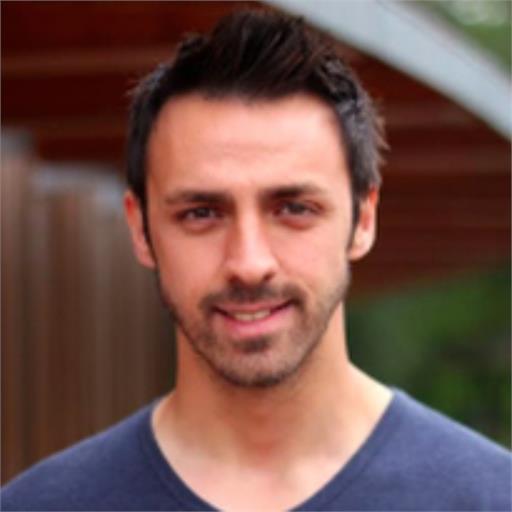
Webinar #6
Topic: Ask4Summary and Authorship Forensic
Date and Time: 9:00 PM to 10:00 PM in GMT+8, December 18, 2024
Check for your local time at https://www.timeanddate.com/worldclock/fixedtime.html?iso=20240923T2000&p1=33
Free Registration Link:
Free Registration QR Code
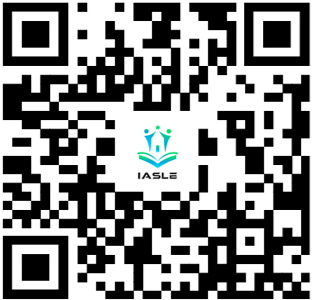
Abstract
While the generative AI is popular with the public, the dataset used for training the generative AI is too broad to be helpful for teaching and learning. For example, a teacher believes concept #A is more important than concept #B and has supplied all course materials and supplemental readings to students reflective of this concept weighting. If their students then use a generative AI tool trained with different dataset, which emphasizes concept #B, students might learn different materials and could even fail subsequent course exams.
This talk will cover two of my Natural Language Processing (NLP) research. Ask4Summary (https://ask4summary.vipresearch.ca/) has a system periodically running backend services to process course’s learning materials and answers user questions by identifying relevant content and generating summaries only based on the provided materials. Ask4Summary has reached 82.69% success rate for providing quick (0.766 seconds in average) responses of course relevant questions and is available for users in interactive web, Moodle plug-in form, and Python library. Authorship Forensic research uses both of Statistical and Neural NLP to correctly distinguish the works created by ChatGPT 3.5, ChatGPT 4, and human authors with high precision rate (i.e., not mis-pointing finger on human authors and incorrectly labelling their works as AI-written ones) 98.06% and F0.5 score 0.96 in our preliminary study.
Speaker
Maiga CHANG, Full Professor, School of Computing and Information Systems, Athabasca University
Speaker’s short bio
Dr. Maiga Chang has been appointed as an IEEE Computer Society Distinguished Visitor on natural language processing and chatbot for 2023 to 2025 (https://www.computer.org/profiles/maiga-chang) and also recently received Distinguished Researcher Award from Asia Pacific Society on Computers in Education (APSCE) in 2022 (https://new.apsce.net/apsce-award-winners/). Dr. Chang is editors-in-chief (2019~) of Journal of Educational Technology & Society (https://www.j-ets.net/, an open access Web of Science’s SSCI journal). He has given more than 150 talks and lectures in different events and (co-)authored more than 255 book chapters, journal and international conference papers.
